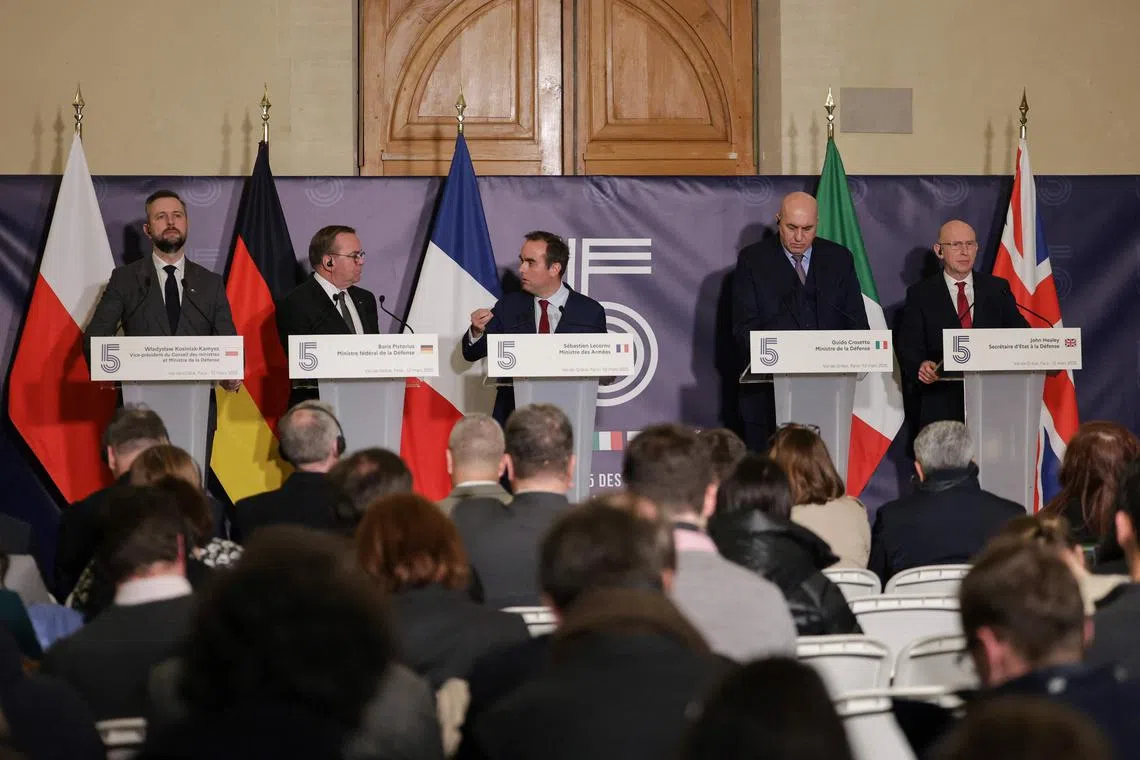‘Very broad consensus’ emerging among Europeans on Ukraine, says France
Sign up now: Get ST's newsletters delivered to your inbox

(From left) Defence ministers from Poland, Germany, France, Italy and Britain holding a press conference after a meeting about Ukraine in Paris on March 12.
PHOTO: AFP
Follow topic:
PARIS – A “very broad consensus” is emerging among European nations on boosting Ukraine’s long-term security through the Ukrainian armed forces, French Defence Minister Sebastien Lecornu said on March 12, after a meeting of Europe’s five key defence powers in Paris.
The defence ministers of Europe’s five main military powers – France, Britain, Germany, Italy and Poland – addressed reporters after meeting earlier on March 12 for talks in Paris.
They acknowledged the challenges posed by the new administration of US President Donald Trump – which is seeking direct talks with Russia to end the war sparked by the Russian 2022 invasion of Ukraine – while insisting Europe was ready to stand on its own feet.
Ukrainian Defence Minister Rustem Umerov took part in the meeting by video link.
“There is obviously a very broad consensus emerging... that the first of the security guarantees for Ukraine is obviously the Ukrainian army itself,” Mr Lecornu told reporters, ruling out any postwar “demilitarisation” of Ukraine.
“The word ‘demilitarisation’ is emerging, but it is not the case. On the contrary, the real guarantee of long-term security will be the capabilities that we will be able to give to the Ukrainian army,” Mr Lecornu, a top ally of French President Emmanuel Macron, added.
Mr Lecornu said that “at this stage, about fifteen countries have shown an interest in continuing this process”, referring to proposed options for a “security architecture” with a view to a lasting ceasefire” in Ukraine.
He warned against seeing Ukraine’s post-war security solely in terms of European troops who could be deployed there, repeatedly insisting that this was not an issue to be decided on now.
Polish Defence Minister Wladyslaw Kosiniak-Kamysz also welcomed a “real unity of the continent”, referring to the threat from Russia.
In his view, it was a matter of “keeping Russia at a distance from all our states as much as possible, and to do that, we must help Ukraine”.
‘We must step up’
German Defence Minister Boris Pistorius said that, despite the rapid pace of change, the current situation could help Europe.
“I am convinced that if we act now, if we choose security in Europe over the nitty-gritty of national interest, we will emerge from this situation strengthened,” he said.
British Defence Secretary John Healey said Britain and its allies knew that “we must step up” and re-arm.
“We are looking to build a coalition,” he said. “We are accelerating this work.”
He added: “In the coming weeks you will see European allies coming closer together.”
He also spoke of “decisive days in the push for peace in Ukraine”, but added that after March 11’s agreement between Ukraine and the US, it was up to Russia to show it was serious.
“I say to President (Vladimir) Putin, ‘It is over to you now’. You said you wanted talks. Prove it. Accept the ceasefire, start negotiations, and end the war.”
He said: “Make no mistake: the pressure is now on Putin.”
The defence ministers addressed reporters after Ukraine on March 11 gave the nod to a US-backed plan for a 30-day ceasefire
The March 12 meeting also came after Mr Macron on March 11
That rare meeting on March 11 in Paris gathered representatives from 34 countries – most of them from Europe and Nato, but also from Australia, New Zealand and Japan – but excluded officials from the US, which is the leading member of Nato. AFP

